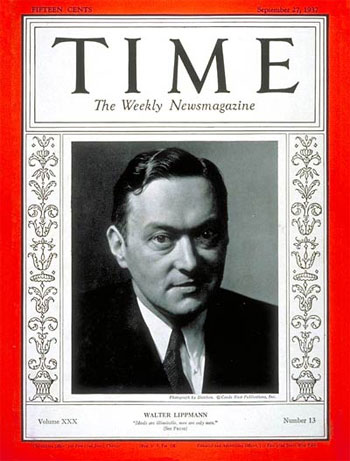Kurt Nimmo
Infowars.com
June 2, 2010
Outrage is rising over a Michigan lawmaker’s plan to introduce a bill to license bloggers and internet-based journalists.
 |
|
| Walter Lippman argued that the people are incapable of accurately understanding the complex “unseen environment” of public affairs and the modern state without a professional and “specialized class” of technocrat-journalists. | |
“State Sen. Bruce Patterson is introducing legislation that will regulate reporters much as the state regulates hairdressers, auto mechanics and plumbers. Patterson, who also practices constitutional law, says the general public is being overwhelmed by an increasing number of media outlets — traditional, online and citizen generated — and an even greater amount of misinformation,” Fox News reported on May 28. “Legitimate media sources are critically important to our government,” he said.
The establishment idea that “legitimate” media sources “are critically important to our government” is hardly a new idea.
Obama’s man at the White House Office of Information and Regulatory Affairs, Cass Sunstein, is on record as advocating holding blogs and alternative internet news media “responsible” for the information they publish. Sunstein penned a book entitled “On Rumors: How Falsehoods Spread, Why We Believe Them, What Can Be Done.” Sunstein’s book is essentially a blueprint for imposing online censorship. Kyle Smith, writing for the New York Post, notes that Sunstein would force bloggers and others not connected to the corporate media to prove criticism of the government and government officials.
“The litigation expense would be daunting,” writes Smith, “the time necessary to defend a posting (or an article) would work to the benefit of the public figure being criticized since the delay would probably allow the figure to win an election before the truth ‘won out’. The mere threat of retaliatory actions would be enough to dissuade many commentators from daring to issue a word of criticism or skepticism” and would result in self-censorship.
In order to enforce the government world view and its demands for political correctness, Sunstein has suggested infiltration of the blogosphere and dispatching covert agents into “chat rooms, online social networks, or even real-space groups.”
Sunstein’s program would target those advocating false “conspiracy theories,” in other words “an attempt to explain an event or practice by reference to the machinations of powerful people, who have also managed to conceal their role.”
“Sunstein’s closeness to the President, as well as the highly influential position he occupies, merits an examination of the mentality behind what he wrote,” writes Glenn Greenwald.
Obama’s Supreme Court nominee, Elena Kagan, also shares the mentality calling for government imposed censorship, specifically as it relates to the government assuming authority to prohibit corporations from engaging in political speech such as publishing pamphlets that advocate the election or defeat of a candidate for federal office.
In March, Infowars.com reported on Rutgers University law professor Ellen Goodman, who is a “distinguished” visiting scholar with the FCC’s Future of Media Project. Goodman submitted a proposal for a government takeover plan targeted at the internet called the National Broadband Plan.
Commissar Goodman said the government needs to provide “narrative content necessary to involve the entire population in democratic decision making or to foster widespread economic and social flourishing.” She said there are “information gaps” in the investigative journalism arena, especially in regard to “undeserved, minority, and poor populations.” Goodman wants to “transcend” the “legacy public broadcasting system” in order to “correct these deficits,” including a government takeover of commercial television.
This “narrative,” of course, would be dictated by the government and the corporate and banking elite that controls and steers it.
Goodman is not alone. FCC Commissioner Michael Copps has also come out in favor of government control of internet journalism. Coops told PBS’ Bill Moyers that the government has an interest in how the internet is used to “serve the American people.”
The government and especially the corporate media have pushed the idea that “citizen journalism” is dangerous and should be licensed and regulated if not eliminated altogether.
In 2007, the Atlanta Journal-Constitution published a column suggesting citizen journalism “isn’t journalism at all, and it opens up information flow to the strong probability of fraud and abuse.” David Hazinski said the corporate media must act to ensure its monopoly on news by advocating the regulation of bloggers and alternative journalists.
It can be argued that the corporate media engages in fraud and abuse continually, although this does not seem to be a concern for Mr. Hazinski. Case in point: the patently false claims made by neocons ensconced in the Bush administration and the Pentagon in order to provide a pretext for the invasion of Iraq. One culprit in particular, Judith Miller of the New York Times, was not punished for engaging in fraud and abuse. She is now a regular fixture on the neocon television network Fox News.
Corporate media is not about journalistic standards, objectivity, and an unbiased search for the truth, as Hazinski would have us believe. It is about propaganda in the name of the state. As Walter Lippman noted, corporate media is concerned with “the manufacture of consent,” not truth. Lippman argued that the people are incapable of accurately understanding the complex “unseen environment” of public affairs and the modern state without a professional and “specialized class” of technocrat-journalists.
Internet journalism has displaced this “specialized class” and has up-ended the once taken for granted primacy of the corporate media. This is why we are experiencing increasing calls by bureaucrats and the mandarins of the corporate media for a concerted effort to regulate bloggers and alternative journalists.
Manufactured consent for endless war, world government, and engineered control schemes such as climate change and deceptive economic palliatives designed to benefit bankers and the elite will not be successful if alternative media is allowed to question these policies and directives.